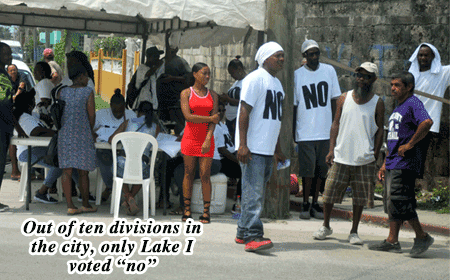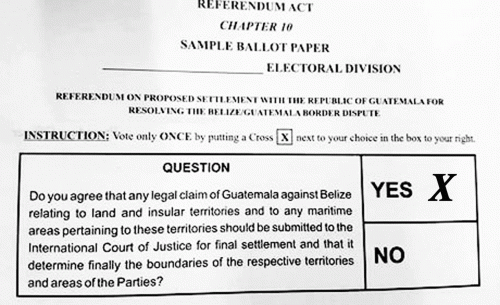The ICJ will be tasked to determine, finally, the boundaries of Belize and Guatemala
BELIZE CITY, Thurs. May 9, 2019– Belizeans went to the polls yesterday, Wednesday, to vote in a historic referendum, definitely the first of its kind since the nation got its independence in 1981. Like their Guatemalan counterparts, voters in Belize were asked to vote yes or no to the following question: “Do you agree that any legal claim of Guatemala against Belize relating to land and insular territories and to any maritime areas pertaining to these territories should be submitted to the International Court of Justice for final settlement and that it determines finally the boundaries of the respective territories and areas of the Parties?”
At the end of the balloting, when the results were finally announced today, Thursday, the “yes” votes had exceeded the “no” votes across the country by over 10,000 votes.
Chief Elections Officer Josephine Tamai announced that there was a total of 53,388 “yes” votes, while the total number of “no” votes was 43,029.
Initially, it was stated that the result would not have been broken down by constituencies, but as the referendum approached, the idea of only reporting one overall figure as the result was scrapped.
Remarkably, of the 10 divisions in Belize City, only Lake Independence voted “no.”
Under Belize’s original Referendum Act, a threshold of 60 percent of all registered voters would have been required in order for the results of the referendum to be valid. Prior to the ratification of the Special Agreement, however, Belize relented and amended its Referendum Act to make allowance for a simple majority of the votes cast in a referendum, placing Belize’s referendum law on parity with Guatemala’s.
In late January, Prime Minister Dean Barrow announced via a press release, that his Cabinet supported a “yes vote” for taking the Guatemalan claim to the International Court of Justice, (ICJ)) then in less than 24 hours, the Opposition, People’s United Party, whose leader went on a national consultation tour, announced their “no” stance to taking Guatemala’s claim to the ICJ.
With the two main political parties on opposite sides of the ICJ fence, the battle lines were drawn for the showdown that was to come on referendum day—especially when both parties mobilized their supporters and machinery as if they were participating in a general election.
With the stage set, it was into the breach when the polls opened across the country at 7:00 a.m. yesterday, Wednesday, May 8, and the voting began in earnest.
The designation of May 8 as the date of the referendum took place after the Chief Justice, Hon. Kenneth Benjamin, at the Belize Supreme Court, granted an interim injunction on the referendum set for April 10, 2019, after five PUP parliamentarians and one PUP standard bearer had lodged a constitutional challenge to the Special Agreement.
The Special Agreement was signed between Belize and the Republic of Guatemala in December 2008, in accordance with the Confidence Building Measures to bring an end to the Guatemalan claim of Belize territory. The Special Agreement became a treaty between the two countries when instruments of ratification were exchanged in 2015.
It is in accordance with the protocol of the Special Agreement that both Belize and Guatemala agreed to hold a referendum for their citizens to determine if they want the ICJ to settle the border dispute in a final and binding settlement.
Guatemala held its referendum on April 15, 2018, and although only 26 percent of its eligible voters participated in the referendum, the result was a resounding “yes” to taking the claim to the ICJ.
Throughout yesterday, there were running commentaries on the progress of the balloting and, with many reports indicating that voters were trickling in, it appeared that there was going to be a low voter turnout. That was not the case, however, when the results of the balloting were finally tallied.
Shortly after 7:00 p.m. the results began to come in from all across the country, with various correspondents reporting on the number of persons who had voted in 31 electoral constituencies.
By the time the 9:00 o’clock hour arrived, the unofficial results for about 9 constituencies were already in, and the proponents of the “yes” vote had taken a pronounced lead.
One pundit on KREM Radio and TV remarked at that time that if the trend were to continue, then there was no way that the proponents of the “no” to the ICJ would catch up, much less get ahead of the clear lead the proponents of the “yes” vote had established. That trend continued throughout the night.
The referendum, similar to all elections held in Belize, was peaceful, but the process wasn’t perfect. The Commonwealth Observer Group noted a number of issues, including that some potential voters reported “being denied the franchise as a result of inability to produce required voter re-registration documents from the Office of Vital Statistics”; that there was a question about “the adequacy and sufficiency of voter education”; and that there was a “lack of regulations and appropriate provisions for legal challenges in the Belize Referendum Dispute Referendum Act, 2019.”
With respect to legal challenges to the referendum, the May 8 referendum was held despite the constitutional challenge to the Special Agreement that has been filed, and which is still an ongoing matter before the courts.
Last Monday, in the Supreme Court of Chief Justice Hon. Kenneth Benjamin, there was a case management for the substantive claim and on Friday, the Court of Appeal held a case management conference with respect to the appeal of the government and the cross-appeal of the PUP claimants, who are appealing the Chief Justice’s decision that he did not find a serious issue to be tried with respect to the signing of the Special Agreement by the Foreign Minister, which, they argue, was a breach of the separation of powers principle.
The case at the Supreme Court cannot proceed until the appeal at the Court of Appeal is heard and a ruling is made.


